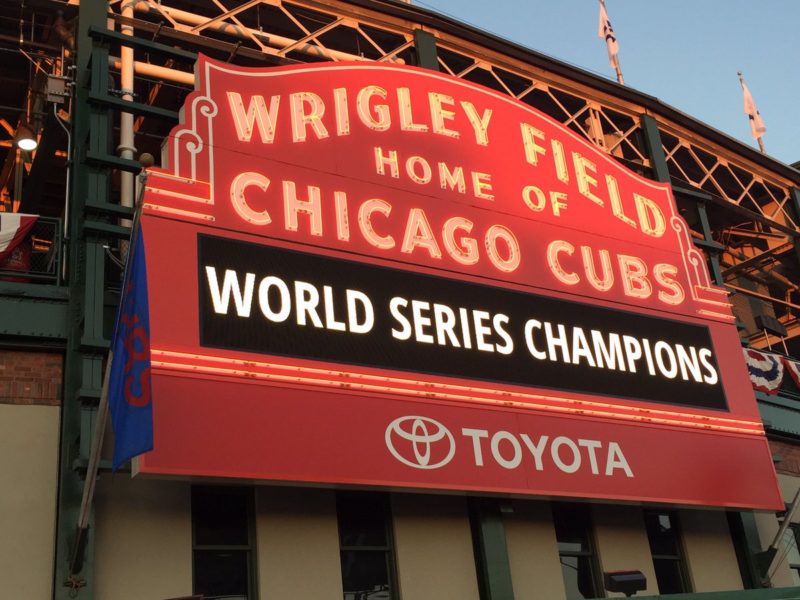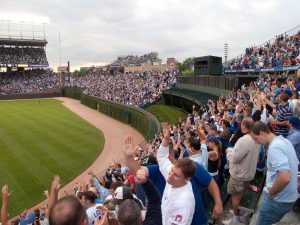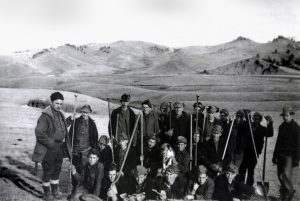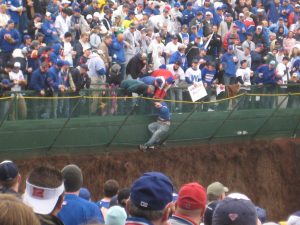
Here’s the question: is there a way to capture the passion of sports fans for the work of community engagement?
Put another way: are the goals and interactions of people who care about – and even are passionate – about their neighborhood or other community fundamentally different from the commitments of fans to their sports team?

I’m a Chicago Cubs fan. A BIG fan.
So, the Cubs winning the World Series is a big deal to me. There was the history of failure and near misses. The legends of curses. The hope of building a good team. And the excitement – and relief – of triumphing in the tenth inning of the 7th game of the World Series. All wonderful stuff (Sorry, Cleveland Indians fans).

This seems a long way from a stream clean-up, a neighborhood crime watch or a recreation league. Most community engagement is pretty local. The “sports heroes” are your fellow neighbors, not some highly paid athlete who jets across time zones. And the wins and losses on community challenges can sometimes be a lot fuzzier than for a baseball game of “Three Strikes and You’re OUT!”
On a similar track about community, big events, and emotions, I want to note a connection to communal grief related to mass violence, as blogged by Melody Warnick. Melody focuses on the other end of community emotion and commemoration: Have you ever participated in a candlelight vigil in your town or another kind of community mourning ritual? Did it help?
I will focus on the passion around sports: striving, hope and happiness. Is there a way to transfer or “inject” some of that kind of passion into community engagement?
Two ideas to help start a conversation:
The simplest answer is “No.” Fandom is irrational and a roller-coaster of emotions. Why do people care so much about games that do not affect their life? We (fans) choose a team (often by family inheritance or other happenstance) and root for them. Why do we do it? It isn’t to do something that benefits a community in a way of doing service to others. It is often selfish – I want to be a winner through my team. Why would we want this to motivate – or infect – community engagement? It seems much too volatile.

The moral equivalent of war. In a 1908 lecture, American philosopher William James wrestled with the idea of promoting political unity and civic virtue in the absence of war or a credible threat. A focus on national unity is a long way from local community engagement, but the question of how to do this without relying on an external threat has a parallel to sports teams and their fans.Sports is often compared to war and struggle. Part of being a fan is sympathizing with your team’s losses (casualties) and victories. James’s idea was to pursue “civic virtue” through a national service that would conduct “warfare against nature.” One commentator says that James’ thinking is the inspiration for all U.S. service programs outside the military: from the depression-era Civilian Conservation Corps, to the Peace Corps, VISTA, and AmeriCorps (and, similar efforts outside government, like Teach for America and Code for America).
So, the two ideas could be seen as opposite answers.
Either:
- National unity, purpose and strenuous action can lead to civic virtue. Therefore maybe some friendly competition – drawing from the power of sports and being a fan – can do good things for community engagement.
Or
- Naaaah. Too much craziness in sports fans. Face Paint. Tribal jerseys (Vikings? Sooners? Wolfpack? Tarheels?). Even the din of vuvuzelas in soccer. Leave that at the stadium or ballpark.

What do you think?

I have found creating a sense of excitement and urgency in projects is helpful and increases participation. Similar to how a community responds when their sports team begins to win. Often times we have long comment periods especially for long range planning studies. I have found people are interested but feel there is always tomorrow to get involved. Instead, we have been implementing intense two to three week community dialogues where we use a strong communications strategy to create awareness and get everyone talking about the topic/issue and responding immediately. For a recent project we had 2,100 people get involved in just 3 three weeks (over a 1,000) in the first week. This was in a town with only 10,000 residents.
Theresa – nice point about a sense of time-limited urgency. Games, and seasons, have the clear punctuations of excitement and win/lose to keep fans’ interest. I like your comparison between long-range planning where “there is always tomorrow to say something” vs. your short-term focus for intense dialogue. My question: what is the payof for the participants in the short-term? Is there a decision or at least narrowing of options so they see some similar near-term effects of their efforts? I’d be glad to see your link (or further info) about involving 2100 people out of a town’s population of 10,000 – that is a REALLY HIGH, wonderful, percentage in my thinking. Thanks, John